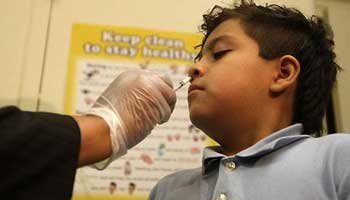
|
Since 1992, every Cuban newborn is immunized against the hepatitis B virus with the vaccine, Reyes said, adding that students, health staff and dialysis patients deemed vulnerable to the virus were also vaccinated.
Currently, all Cubans under 31 are immunized against infections, the expert said, noting that compared with 1989, the number of hepatitis B cases in the country had dropped by 99.09 percent to only 21 cases by the end of 2011. Those who were infected are all aged 30 and above.
Hepatitis B virus is spread through contact with human fluids such as blood and semen and is one of the five identified viruses that causes liver inflammation and may lead to chronic hepatic diseases, including cirrhosis and cancer.
The biotech center, which exports the anti-hepatitis vaccine to some 40 countries, has developed more than 10 vaccines which have contributed significantly to the island's public health, said Hugo Nodarse, director of the Department of Cancer Research at the center.
Cuba's immunization programs have been credited with great success in recent years with the development of a wide range of vaccines against chronic diseases such as pneumonia, meningitis, diphtheria, pertussis and dengue.
The greatest achievement in the country's medical biotech development is the CimaVax-EGF vaccine for lung cancer, which is said to be the only one of its kind in the world and has been exported to over 40 countries.
VietNamNet/Xinhuanet